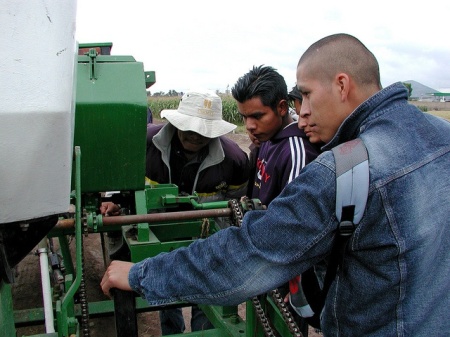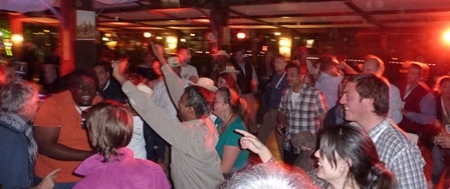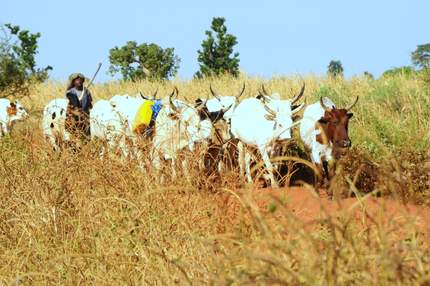The Second Global Conference on Agricultural Research for Development (GCARD 2012) brought together all groups of stakeholders: from researchers to donors such as the FAO, EC or IFAD, to farmers organizations or the private sector.
The surprise at the conference co-organized by GFAR and the CGIAR Consortium was the recognition of the role that young professionals play in AR4D. For the first time in such a high level event, an international organization by youth for youth had the opportunity to be “the voice” of young professionals in this field of expertise. GCARD 2012 was the place where YPARD (the Young Professionals’ Platform for Agricultural Research for Development) was given the opportunity to organize both a full day pre-conference meeting on “Engaging with youth and working with them to shape the future of ARD” and participating in a live webcasted session on “Individual Learning and the Empowerment of Women and Youth” where YPARD had the possibility of presenting its opinion on the aging population in ARD and the measures that should be taken in order to involve more young professionals in both agriculture and agricultural research.
Young professionals were also given a voice through the Social Reporting team. 32 young people from all over the world made sure that AR4D is back in the spotlight and brought to the attention of world leaders. We used all kind of tools such as Twitter, Facebook, live webcasting, Storify, Delicious or blog posts and they managed to get people excited in what’s going on in Uruguay and the AR4D world.
Sometimes it is hard to feel the censorship of meetings behind closed doors or the pressure put on their shoulders by the fact that they represent not only their universities/organizations/research institutes, both also their countries and an entire generation. Nevertheless, this small group of young professionals made quite an impression.
Day after day, the shyness of people disappeared and everybody was asking about “those young professionals“. We were not shy. We talked with everybody, we discussed about GMOs and food security. We said our opinions about how should youth and women be better represented in AR4D.
We gave our honest opinions about every subject even when that opinion seemed to step on some toes.
Here are a few highlights of what we think:
Sustainable Ego-systems – by Machteld Schoolenberg
Watch your back – by Santiago Fernandez
The Global Food Policy – by Codrin Paveliuc Olariu
WHO`s Listening? – Youth. Women. Empowerment. - by Keron Bascombe
I want to be President – by Keron Bascombe, Idowu Ejere and Dinesh Panday
We proved that it is worthwhile to get young professionals involved. Our input should not be related just to social reporting. Through our blog posts and social reporting we gave valuable content, creating new lines of actions for working on future challenges.
But we are still young, creative and, besides giving feedback and added value to an experienced community of researchers, we brought something else to the GCARD 2012: our young spirit. By excellence, this drives us forward and, through its creative nature and its energy, the world around it.
On the last day of the GCARD 2012, after the six field trips that were organized, all the participants gathered for a “farewell dinner.” We are young and energetic and we make the others feel the same way also.
All the young professionals at the GCARD 2012 deserve a round of applause. They represented their countries and their generation with great honor and…they did a great job.
Follow these people in the future as you will surely hear only great things about their work:
Nawsheen Hosenally (Mauritius), Emmie Kio Wachira (Kenya), Luis Suarez (Peru), Sridhar Gutam (India), Jieying Bi (China), Codrin Paveliuc Olariu (Romania), Federico Sancho Guevara(Costa Rica), Matsimbe Msekiwa (Malawi), Olawale Isaiah Ojo (Nigeria), Caity Peterson (USA),Dans Johnson (Sierra Leone), Myriam Perez (Spain), Machteld Schoolenberg (Netherlands),Dinesh Panday (Nepal), Marina Cherbonnier (France), Cristina Iglesias (Ecuador), Meerim Shakirova (Kyrgistan), Firdavs Kabilov (Uzbekistan), Mai Touma (Syria), Yash Sahrawat (India),Idowu Ejere (Nigeria), Keron Bascombe (Trinidad & Tobago), Randall Cordero (Costa Rica),Bernardo Thompson (Uruguay), Carolina Minchiotti (Uruguay), Fernanda Falcone (Uruguay),Juan Pablo Albornoz (Uruguay), Natalia Gerpe (Uruguay), Noelia de los Santos (Uruguay),Rodrigo Torres (Uruguay), Santiago Fernandez (Uruguay), Tatiana Cortazzo (Uruguay), Victoria Pereira (Uruguay).
Blogpost by the Young Professionals present at GCARD2
Reblogged from the GCARD2 Blog


